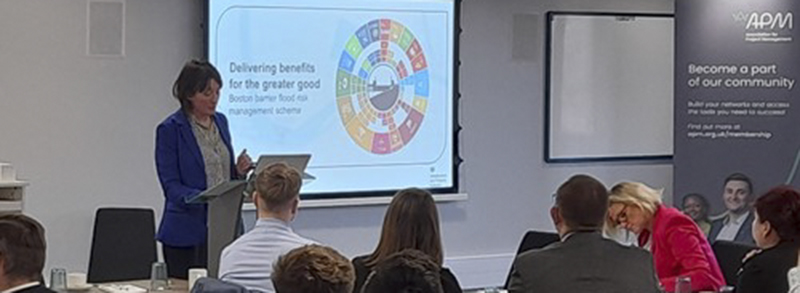The future of project data analytics, a discussion
New technology is transforming projects, but companies must approach it in the right way to ensure their project teams can understand and use it, delegates at an Association for Project Management (APM) event heard.
APM’s Corporate Partner Seminar on the future of project data analytics looked at how the project profession must build skills and capability to unlock the potential of data and digitisation.
The event, held at Aston University, Birmingham, featured presentations from project leaders and digital experts on a broad range of data-related topics, along with case studies, group discussions, and Q&A sessions.
Speakers included:
- Dr Jo Jolly, Deputy Director and Head of Project Futures, Infrastructure and Projects Authority
- Matthew Mann, Performance Management Director, HS2
- John McGlynn, former APM Chair and Project Delivery Director, Atkins
- James Montrose, Associate Director, KPMG
- Andy Murray, Executive Director, Major Projects Association
- Martin Paver, Chief Executive and Founder, Projecting Success
- Mark Thurston, Chief Executive, HS2
The seminar explored the current picture around the use of project data analytics within the profession, changes required to mindset organisational culture to realise opportunities, the perspective from within government, and how APM is supporting its corporate partners when it comes to building skills and capability.
One of the main topics of discussion was project data analytics and the rise of AI tools, such as ChatGPT. During his presentation, Martin Paver said:
“We’re driving our projects at the moment by looking in the rear-view mirror. New technology is transforming the role of planners and project reporting. The potential problem with all this is 'do you understand it and can you use it?' A lot of organisations now are going out and buying expensive tools, but that alone won’t work. What about factors like data integration and data access? You have to think about what your level of ambition is. Is it just to be able to see a little bit better through your rear-view mirror, or do you really want to transform the way you do things?”
James Montrose shared his insights on creating a digital mindset. He acknowledged that the rapid pace of change around project data may feel overwhelming for some people, but advocated for a digital mindset that would enable project and programme professionals to see these changes as opportunities.
“There’s always resistance to change,” he said. “A lot of people feel change is being done to them, so we have to be able to overcome that. When it comes to deploying a digital mindset, focus on ‘why’. Speak the language of benefits. Increase speed of collaboration and communication.”
APM’s project data analytics resource hub has more information and further reading on this topic, including APM research and reports..
APM's Corporate Partnership Programme is aimed at organisations who wish to develop their project management capability and community. Visit the Corporate Partnership page to find out more.
This article appears on the APM news and blog site as "APM Corporate Partners discuss the future of project data analytics" dated Febuary 8, 2023.
--Association for Project Management
[edit] Related articles on Designing Buildings
- Big data.
- Building data exchange.
- Common data environment.
- Chief digital officer CDO.
- Data in the construction industry.
- Digital Transformation in the Construction Project Management Industry.
- Database.
- Data-centric business model.
- Data custodian.
- Data and behaviours in construction.
- Data collection strategies.
- Data drop.
- Data manager.
- Data Protection Act.
- Data readiness.
- General Data Protection Regulations (GDPR).
- How data can stop waste.
- Microsoft Project - software for project management.
- Open data.
- Structured data.
- Top big data tools used to store and analyze data.
- Treating data as part of infrastructure.
- Unstructured data.
- Virtual reality and big data disrupting digital construction.
Featured articles and news
Increased vigilance on VAT Domestic Reverse Charge
HMRC bearing down with increasing force on construction consultant says.
Call for greater recognition of professional standards
Chartered bodies representing more than 1.5 million individuals have written to the UK Government.
Cutting carbon, cost and risk in estate management
Lessons from Cardiff Met’s “Halve the Half” initiative.
Inspiring the next generation to fulfil an electrified future
Technical Manager at ECA on the importance of engagement between industry and education.
Repairing historic stone and slate roofs
The need for a code of practice and technical advice note.
Environmental compliance; a checklist for 2026
Legislative changes, policy shifts, phased rollouts, and compliance updates to be aware of.
UKCW London to tackle sector’s most pressing issues
AI and skills development, ecology and the environment, policy and planning and more.
Managing building safety risks
Across an existing residential portfolio; a client's perspective.
ECA support for Gate Safe’s Safe School Gates Campaign.
Core construction skills explained
Preparing for a career in construction.
Retrofitting for resilience with the Leicester Resilience Hub
Community-serving facilities, enhanced as support and essential services for climate-related disruptions.
Some of the articles relating to water, here to browse. Any missing?
Recognisable Gothic characters, designed to dramatically spout water away from buildings.
A case study and a warning to would-be developers
Creating four dwellings... after half a century of doing this job, why, oh why, is it so difficult?
Reform of the fire engineering profession
Fire Engineers Advisory Panel: Authoritative Statement, reactions and next steps.
Restoration and renewal of the Palace of Westminster
A complex project of cultural significance from full decant to EMI, opportunities and a potential a way forward.
Apprenticeships and the responsibility we share
Perspectives from the CIOB President as National Apprentice Week comes to a close.
























